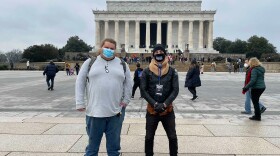
Hannah Allam
Hannah Allam is a Washington-based national security correspondent for NPR, focusing on homegrown extremism. Before joining NPR, she was a national correspondent at BuzzFeed News, covering U.S. Muslims and other issues of race, religion and culture. Allam previously reported for McClatchy, spending a decade overseas as bureau chief in Baghdad during the Iraq war and in Cairo during the Arab Spring rebellions. She moved to Washington in 2012 to cover foreign policy, then in 2015 began a yearlong series documenting rising hostility toward Islam in America. Her coverage of Islam in the United States won three national religion reporting awards in 2018 and 2019. Allam was part of McClatchy teams that won an Overseas Press Club award for exposing death squads in Iraq and a Polk Award for reporting on the Syrian conflict. She was a 2009 Nieman fellow at Harvard and currently serves on the board of the International Women's Media Foundation.
-
Two distant cousins connect online, only to learn that one is a militant leftist and the other is in a right-wing militia. Their story shows the complexities of a timely question: Who's an extremist?
-
This week in both House and Senate hearings, police officials testified on the Jan. 6 insurrection. The rise of right-wing extremism might make preventing the next violent outbreak more challenging.
-
Some 25,000 National Guard members are in the city where insurrectionists stormed the U.S. Capitol just two weeks ago.
-
As thousands of security forces deploy nationwide in anticipation of unrest ahead of the inauguration, there has been a national reckoning over how seriously to take the right-wing extremist threat.
-
Many of President Trump's extremist followers expressed white supremacist views when they attacked the U.S. Capitol last week. What will come of them when Trump leaves office in ten days?
-
Five people died following the storming of the Capitol building, including a police officer. The attack renewed criticism over how officials are addressing the growing threat of far-right extremism.
-
One of the most shocking parts of Wednesday's pro-Trump mob attack on the U.S. Capitol was just how quickly it all unfolded. We examine the historic, and troubling day.
-
The many unknowns in the Christmas Day bombing in Nashville, Tenn., have raised questions about whether the incident should be classified as a terrorist act.
-
Terrorism analysts warn that the country's polarization isn't just damaging to U.S. politics — it's a national security threat.
-
A group of bipartisan, former national security officials are warning that the ever deepening political divisions in the U.S. are a true national security threat.



